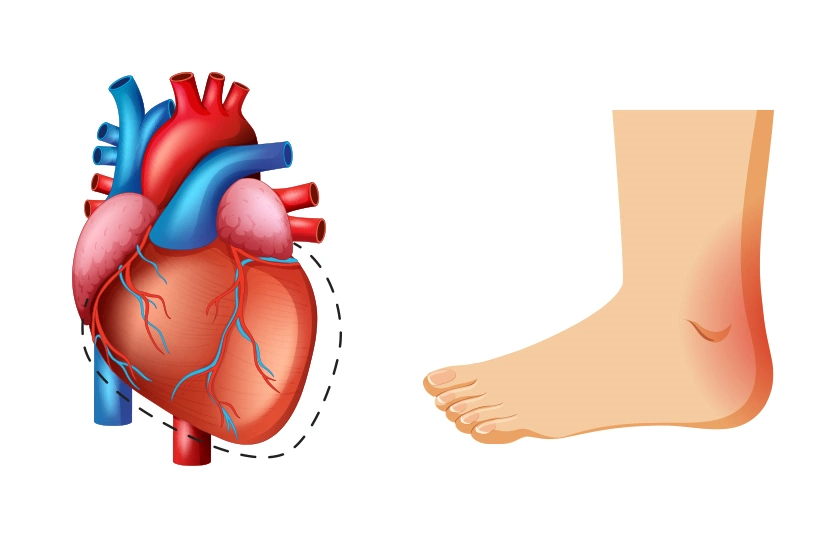
A swollen foot might seem like a minor issue—perhaps due to a sprain, a long day, or weather changes. But what if that swelling persists or spreads to both legs? Could your heart be behind it?
In many cases, swelling in the feet and legs is the body’s early warning system. When your circulatory or lymphatic system is under stress, or failing to keep up—the lower limbs often show the first signs. And sometimes, it’s more than just a vascular concern: it could signal heart failure.
Let’s explore how heart issues can lead to swollen legs and feet, and when you should take that swelling seriously.
Understanding Swelling in Feet and Legs
Swelling in the lower limbs—medically called edema—occurs when excess fluid builds up in the tissues. Gravity pulls this fluid downward, which is why feet, ankles, and legs are commonly affected.
Common Causes of Swollen Feet:
- Injury or infection: A twisted ankle or cellulitis can cause localized swelling.
- Kidney or liver disorders: These organs help regulate fluid balance—dysfunction can lead to swelling.
- Venous insufficiency: When leg veins struggle to return blood to the heart, fluid leaks into surrounding tissues.
- Heart failure: The heart’s reduced pumping capacity leads to fluid backup, especially in the lower body.
- Lymphedema: Due to blocked lymphatics, commonly due to a cancer or infection.
So, when people ask, “Swollen ankles are a sign of what?” — the answer can range from minor issues to serious cardiovascular or vascular conditions.
The Connection Between Heart Health and Swelling
Your heart acts like a pump. When it weakens, blood starts to back up—first in the lungs (left-sided failure), and then in the veins (right-sided failure). The pressure pushes fluid out of the blood vessels and into the surrounding tissues, often in the feet, ankles, and legs.
Signs and Symptoms of Heart Failure That May Include Swelling:
- Swelling in both legs or ankles (more noticeable at the end of the day)
- Fatigue and shortness of breath
- Difficulty lying flat due to breathlessness
- Sudden weight gain due to fluid retention
- Tight shoes or socks due to leg swelling
Left vs. Right-Sided Heart Failure:
- Left-sided failure causes fluid backup in the lungs (causing breathlessness).
- Right-sided failure causes swelling in the legs, feet, abdomen, and liver.
Swelling due to heart failure is often symmetrical, soft to touch, and may leave an indentation (pitting edema) when pressed.
When Swollen Feet May Indicate a Heart Problem
Swelling is common, but there are red flags to watch for:
Key Warning Signs:
- Swelling in both legs or feet, especially with breathlessness or fatigue.
- Swelling that worsens at night or doesn’t go down with rest.
- Associated with chest discomfort, cough, or irregular heartbeat.
- Rapid weight gain over a few days.
Ignoring such signs can delay critical diagnosis. What appears to be just swollen feet might be the beginning of congestive heart failure—a condition that requires prompt treatment to prevent complications.
Diagnosis and Tests
When you visit a doctor for leg swelling, a thorough medical evaluation will follow.
What to Expect During Evaluation:
- Medical history and physical exam to assess swelling type and distribution.
- Blood tests: To check kidney, liver, and heart function.
- ECG (Electrocardiogram): Evaluates heart rhythm and previous damage.
- Echocardiogram: Uses ultrasound to assess how well the heart pumps.
- Chest X-ray: May be used to detect fluid in the lungs.
If the swelling is suspected to be from vein problems such as venous insufficiency, deep vein thrombosis (DVT), or varicose veins, a referral to a vascular surgeon is usually recommended. They may perform a venous Doppler scan or suggest vascular imaging to guide treatment.
Treatment Options
If Heart Failure is Diagnosed:
- Diuretics (water pills) to reduce fluid overload
- Salt restriction to prevent fluid buildup
- Medications like beta-blockers or ACE inhibitors to support heart function
Swollen Foot Treatment Based on Cause:
- Compression stockings for venous problems
- Leg elevation to help fluid return to the heart
- Infection management (antibiotics if cellulitis)
- Physical activity to promote circulation
Swollen Legs Treatment Plans May Include:
- Weight loss, reduced salt intake, and better control of blood pressure or diabetes
- Minimally invasive vascular procedures for vein-related swelling (like sclerotherapy or ablation)
It’s crucial to treat both the symptom (swelling) and the root cause (heart or vein issues).
Prevention and Lifestyle Tips
- Avoid prolonged standing or sitting.
- Keep your legs elevated while resting.
- Walk regularly to promote circulation.
- Wear comfortable, non-restrictive footwear.
- Reduce salt intake and stay hydrated.
- Monitor blood pressure, sugar, and cholesterol regularly.
- Don’t ignore early signs—prevention is better than hospitalization.
Conclusion
Swollen feet are not always harmless. If they come with breathlessness, fatigue, or are persistent, it’s time to dig deeper. Your body might be hinting at something more serious, like heart failure or vascular disease. Fortunately, with early diagnosis, modern treatments, and expert care, such conditions can be managed effectively.
If you’re experiencing chronic leg swelling, visible veins, or tightness in your calves, consult a vascular surgeon for a complete evaluation. Early intervention can help you avoid long-term damage and improve your heart and vascular health.
Frequently Asked Questions (FAQs)
If swelling persists for more than a few days without improvement or worsens, it needs medical attention.
Yes, gentle walking improves circulation and helps reduce swelling, unless restricted by injury or pain.
Untreated swelling may worsen, indicate an underlying issue, or lead to complications like skin breakdown or clots.
Typically, both legs swell in congestive heart failure, but one may appear worse due to posture or vein issues.
Peripheral edema is more commonly associated with right-sided heart failure, though both sides can contribute.

Dr. Sumit Kapadia
MBBS, MS, MRCS, DNB-Fellow



